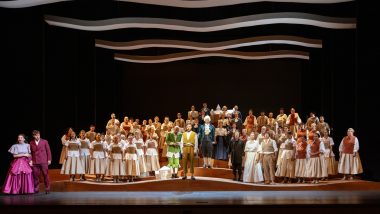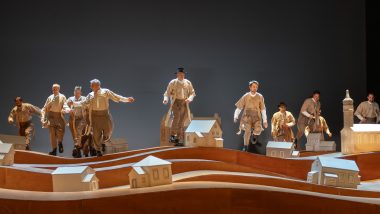Czech Republic Dvořák, The Jacobin: Soloists, Dancers, Youngsters’s Choir, Refrain and Orchestra of the Janáček Theatre Brno / Jacub Klecker (conductor). Nationwide Theatre Brno, 26.11.2023. (GT)

Manufacturing:
Director – Martin Glaser
Surroundings – Pavel Borák
Costumes – David Janošek
Lighting – Martin Špetlík
Choreography – Martin Pacek
Dramaturgy – Patricia Castkova
Refrain director – Pavel Konarek
Youngsters’s Refrain director – Valeria Mat’ašová
Forged:
Rely Vilém of Harasova – David Szendrich
Bohuš – Roman Hoza
Julie – Pavla Vykopalová
Adolf – Tadeáš Hoza
Filip – Jan Šťáva
Jiří – Aleš Brisein
Benda – Petr Levíček
Terinka – Lucie Kankova
Lotynka– Jitka Zerhauová
Antonín Dvořák is most acclaimed for his Cello Concerto, the final three symphonies and the Slavonic Dances – however what number of of his eleven operas are heard? Because the composer wrote at the start of his profession: ‘One among my biggest targets was to put in writing an opera.’ Solely the pleasant Rusalka has entered the repertoire of opera corporations for its fairytale libretto and the aria ‘Track to the Moon’. The Jacobin was his sixth opera written in tandem with a distinct stage work, Dmitrij within the early Eighties. Whereas the latter relies on historic legend, The Jacobin is a country comedy impressed by the composer’s childhood, but with political undertones. Owing to the numerous rewritings of the libretto by Marie Červinková-Riegrová, the opera was not accomplished till 1888 after which revised once more in 1897.
Primarily based on the librettist Jeřábek’s ‘On the Ducal Court docket’, Dvořák’s opera was first referred to as The Welcome, albeit the plot was just about the identical but with totally different names for the principle characters, the second model was referred to as The Arrival of the Gentry, or The Lords’ Arrival. The ultimate model relies on the instances of the Jacobin reign of Terror of 1793, which gave the plot a political enter and to the characters within the opera.
The composer determined to put in writing the opera, ‘for my very own delight and my private pleasure.’ Episodes from Dvořák’s childhood; the village church in Zlonice, and the kids’s choir are outstanding in making certain the opera’s success amongst Czech audiences. The ultimate model of The Jacobin premiered in June 1898, and it has been carried out broadly in Europe, together with on the Welsh Nationwide Opera, the Edinburgh Pageant, the Buxton Pageant, and in a live performance efficiency by the BBC Symphony Orchestra in 2012 beneath Jiří Bělohlávek. The opera has been well-liked within the Czech lands, particularly in Brno, the place it has been staged in sixteen totally different productions.
The plot is a couple of nobleman’s son – Bohuš, who left to affix the French Revolution and was disowned by his father, Rely Vilém, and returns after being sentenced to loss of life by the Jacobites. There may be additionally the narrative of the failed courtship of the silly Burgrave with the charming Terinka, and on the core is the characterisation of the village folks in bringing out all of the humour and faithfulness of their lives. But the village is beneath Rely Vilém, whose rule is harsh and repressive, and the arrival of the outsider (Bohuš) represents a risk to village life. Of significance is the outstanding position of the ladies within the opera; they dominate virtually all of the scenes and have the most effective arias. Dvořák was conscious of Austria’s autocratic rule over Bohemia and the constraints on Czech language, tradition and financial system. Martin Glazer brings out the sentimentality of the work, providing a suggestion of the lifetime of Bohemian village folks, and he’s helped by Dvořák’s richly vibrant harmonies utilizing folks tune custom with the dancing and festivities on stage, making every scene entertaining. The Jacobin is without doubt one of the composer’s most profitable operas alongside Rusalka, Dmitrij, The Satan and Kate and Armida.

The requirements of the Brno Opera had been made clear by staging two fairly totally different operas on successive evenings with totally different casts. The units had been minimal – but they successfully facilitated the stage actions. The opening scene depicted countryside with little mannequin homes on an undulating floor (presumably representing hills) and the church within the background; the color scheme was vivid yellow and orange, with a blue background, and the staging was raised and lowered to go well with the choreography and the scenes in all three acts. The costumes had been applicable for sure characters – a careless becoming inexperienced apparel for Filip, the silly Burgrave – whereas the yellow-attired Adolf made him appear like a rustic bumpkin, and Bohuš’s clothes was an ill-fitting purple go well with.
The opening transient overture is festively rustic, emphasised by the brass with its harshly expressed pointed rhythms, and the curtain opened to point out kids bringing on the mannequin homes to embellish the scene. An offstage choir sang plaintively, ‘Our heads are bent low within the mud’, accompanied by an organ as Bohuš and his French spouse Julie entered. Bohuš sings, ‘Do you hear that? Czechs singing! Ah, that lovely sound’. Roman Hoza’s baritone as Bohuš was clear and heat, albeit at one level he was just a little overwhelmed by the orchestra – whereas the brightly lyrical soprano of Pavla Vykopalová as Julie was distinctive.
On the centre of the motion is the rivalry for the hand of Terinka between Filip the Burgrave, performed with nice appearing by the bass of Jan Šťáva, and the younger gamekeeper Jiří, who betters him each in dexterity and wit. The battle involves a detailed because the Rely arrived – welcomed by just a little inflated pompous choral finale on the finish of the primary act – ‘Oh, we welcome our new Lord!’
It was the 2 sopranos of Terinka and Julie who had been the standouts of the night. Of the male voices, Aleš Brisein’s tenor because the younger gamekeeper Jiří was a robust contender for the most effective singing and appearing. This was particularly in his wittily expressed ‘You realize this man!’ when accusing his rival Adolf, the sinister nephew of the Rely, of discrimination and singing of freedom and a greater life invoking the concepts of the French revolution.
The plot was simple to grasp by the choreography on stage and the distinctive appearing by the principle characters. Dvořák’s music ranged from the richly vibrant orchestration of his most interesting years to the psalmic refrain of the opening scene, and the orchestral enjoying suitably evinced all of the magic of the rating masterfully directed by the Brno-born Jacub Klecker.
The opening of the second act exhibits the rehearsal of the schoolteacher Benda’s cantata with the kids. Once more, this episode manifests the kinship with the Czech character and language which is on the coronary heart of the opera. The kids’s refrain singing Benda’s serenade ‘O hail our Lord’ is pleasant and splendidly carried out, with the blended refrain of the villagers becoming a member of within the kids’s singing. Petr Leviček’s finely characterised schoolmaster Benda comically implores the kids to be taught his music. Among the many different highlights is the duet of Jiří and Terinka singing ‘Glory to the brand new Lord’, particularly notable is Lucie Kankova’s portrayal of Terinka, and after everybody has left, her pretty solo aria, ‘Hail, Lord’ and her singing ‘O father, you haven’t any sympathy for my love’. The duet between Bohuš and Julie, ‘We have now roamed overseas lands’, was excellent in each singing and appearing, and in revealing their plight ‘We have now labored arduous and recognized nice starvation’, but this scene was surpassed gloriously by Julie’s pleasant, ‘In autumn’s hazel grove, love not offers glory!’
Act III takes place within the Vaulted Corridor of the Fortress – the place we uncover that Bohuš was no Jacobin – as an alternative, he’s a Girondist on the run. Julie appeals to the Rely to forgive his son by disclosing that he was sentenced to loss of life by the Jacobites in Paris and solely escaped to return to his house. Accompanied by a beautiful folk-inspired harp melody and touched by Julie’s singing, ‘O forgive me, sort sir!’ the Rely forgives his son and forsakes his chosen successor Adolf and is lastly reconciled with Bohuš and leaves all the things to him and Julie. Lastly, the opera closes with the villagers dancing a polka and singing joyously, ‘The empty halls are full once more!’ in a fantastic celebratory refrain of happiness and pleasure.
This was a massively fulfilling manufacturing that exposed the excellence of the Brno opera firm. The staging by Martin Glaser introduced out all the heat and concord which is so typical of Dvořák’s most interesting creations and most significantly his nice humanity and empathy along with his fellow Czechs. The viewers’s love for this opera was evident and lots of of them watched and listened intently as if each phrase and phrase mattered to them. It was a full home, and the efficiency was rewarded by a standing ovation on the shut. This manufacturing can presently be seen on OperaVision.
Gregor Tassie

